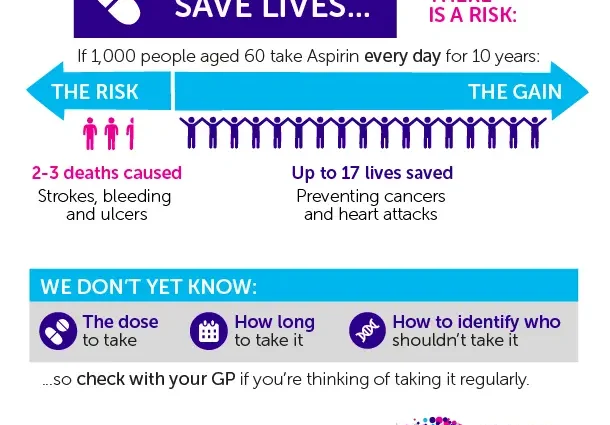Taking aspirin daily can prevent cancer from spreading and even help treat the disease, according to new research.
Researchers from the University of Oxford have shown that a daily dose of a cheap, popular drug can lower the risk associated with many malignancies, and some benefits are visible even after a few months. The National Health Service (the UK’s equivalent of the National Health Fund) is currently working on issuing final recommendations on whether millions of people should start taking aspirin preventively.
Research provides further evidence that aspirin offers significant protection against cancer and significantly reduces cancer deaths. Until now, it has been known that the drug protects against heart attacks and strokes, but recent results suggest that its anti-cancer effects may be even stronger.
The researchers found that patients taking aspirin were less likely to have metastatic cancer at the time of diagnosis than those who did not take it. The risk that the detected cancer will metastasize in the future has been reduced by almost half thanks to the daily intake of aspirin.
The team of researchers who published the article in the Lancet and Lancet Oncology journals was led by Peter Rothwell, author of an earlier landmark publication which showed that aspirin can reduce cancer deaths by more than a third.
A recent study looked at data from 51 studies involving tens of thousands of patients and was originally designed to test the effects of aspirin in preventing heart disease.
– We previously showed that a daily dose of aspirin significantly reduces the long-term risk of developing some malignancies, especially colorectal cancer and esophageal cancer, but these effects did not show up until about 8 to 10 years after starting therapy, says Prof. Rothwell. – Now we have observed that aspirin also has short-term effects that only appear after 2-3 years. In particular, we have shown that aspirin reduces the likelihood of cancer metastasizing to distant organs by approximately 40-50 percent. This is important because it is the spreading process, or metastasis, that usually kills cancer patients.
Given that half of the malignant tumors have metastasized, Rothwell adds, “Out of five people taking aspirin, two are preventable from spreading.” This is a big absolute benefit.
In studies suggesting that aspirin may become useful as an adjunct treatment for cancer, Rothwell also showed that the drug reduces the risk of metastasis even in patients who have just started taking it.
The researcher calls for research that could confirm this as soon as possible. “Our results clearly show that aspirin may be effective as an adjunct therapy to cancer to prevent distant metastasis,” he says.
“It is certainly time to consider the prevention of malignancies when analyzing the risks and benefits of aspirin. So far, all recommendations on this subject were simply based on its effectiveness in the prevention of strokes and heart attacks. New research has really shown that the benefits of the drug in preventing cancer are as great – if not more – than the benefits in preventing heart attacks and strokes. This changes things drastically.
The effectiveness of aspirin has been observed against a number of common cancers that originate in glandular cells, including colorectal, throat, breast, prostate and some lung cancers. Although some of these studies used the standard 300 mg dose of aspirin, Rothwell believes that as little as 75 mg, a quarter of a standard pill, may be more than enough to prevent cancer.
Aspirin prevents the platelets [which mediate the clotting process – Onet] from sticking too quickly. This is believed to make it harder for the cancer cells to spread throughout the body.
According to the researchers, other mechanisms of the drug’s action include: helping to repair DNA damage and stimulating the processes of self-destruction of potentially dangerous cells, which leads to blocking the development of cancer at an early stage.
While aspirin is known to increase the risk of internal bleeding, Prof. Rothwell’s suggest that this side effect is less severe than previously thought, as only a few patients die from additional complications.
– Aspirin increases the risk of non-life-threatening bleeding, after which the vast majority of people recover completely – explains the expert. – On the other hand, conditions that aspirin helps prevent, such as cancer, stroke and heart attack, are more likely to lead to disability or death.
Prof. Rothwell, 47, once stated that he started taking aspirin himself on the basis of his own results, and that many people in their XNUMXs and XNUMXs could benefit from taking it. The researcher notes, however, that it is too early to recommend the widespread use of aspirin by middle-aged people.
– We currently need conclusive guidance from governmental institutions as to whether the use of aspirin should be more widely recommended. It would be good for people considering its use to discuss it with their GP, as sometimes the drug can have side effects, such as internal bleeding, especially in people over the age of 70 – comments Prof. Peter Johnson, chief physician of the Cancer Research UK foundation.
In an editorial in the Lancet article, Andrew Cook and Nancy Chan of Harvard Medical School rate the latest results as “important”, although a large study was excluded from the analysis that did not confirm a decrease in cancer risk [related to aspirin use – Onet ].
A spokeswoman for the UK Ministry of Health said: ‘We are currently considering, with Cancer Research UK, how to provide the best public recommendation on this subject, given that aspirin has potential risks and benefits.
Text: Chris Smyth










